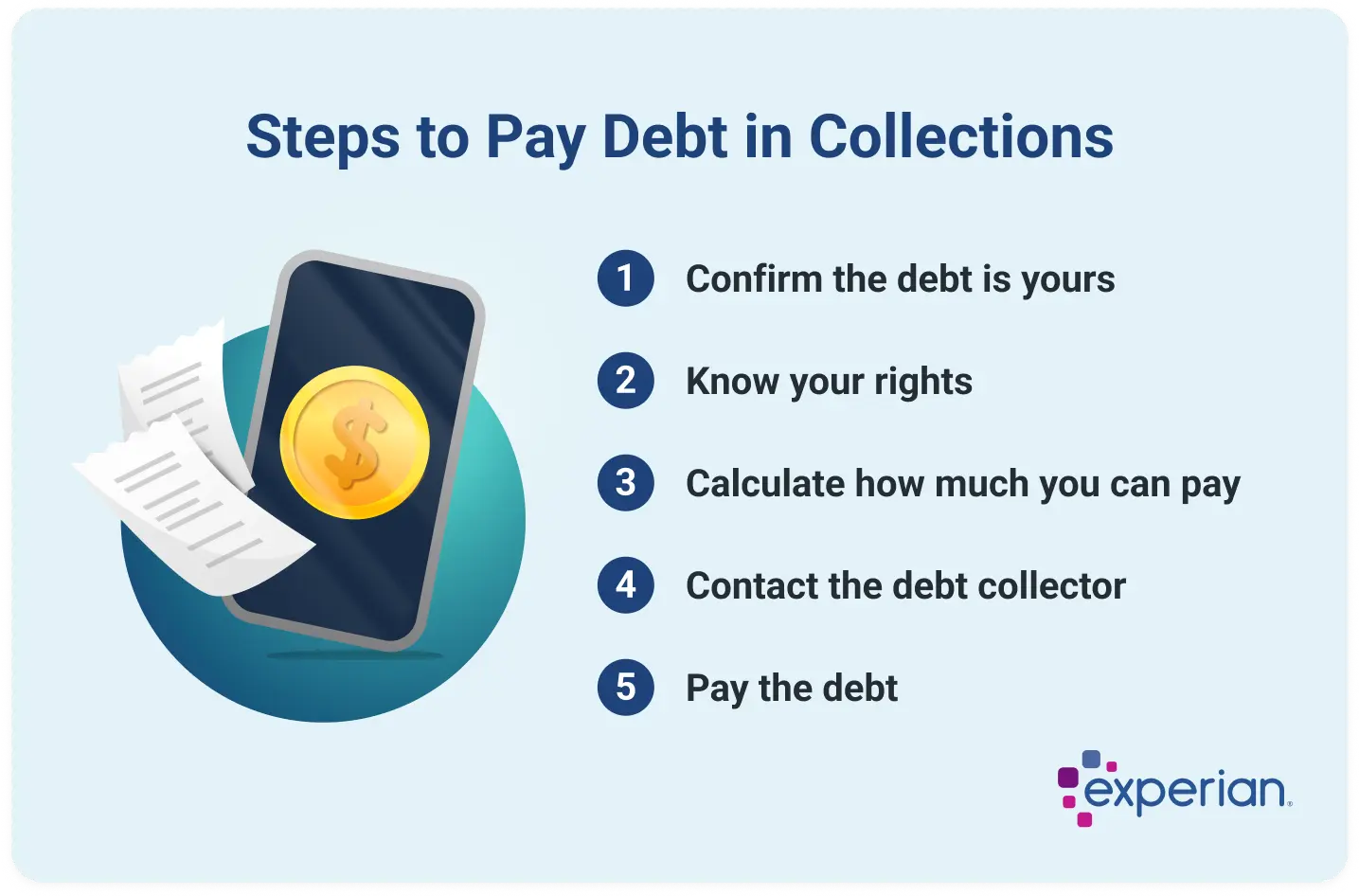How to Pay Off Debt in Collections
Quick Answer
You can pay off debt in collections by following these steps:

Once your debt is sent to collections, it's important to address it rather than ignoring it. Know that you have options: Even if you have trouble reaching an agreement with the creditor, you can still get help from a nonprofit credit counseling service or an attorney.
You can pay off debt in collections by confirming how much you owe, determining what you can afford to pay, contacting the debt collector and paying off the debt.
Regardless of how you decide to address debt that's in collections, it's possible to straighten out your finances. You will eventually see the collection account come off your credit report and your credit scores recover. Here's a step-by-step guide on how to get there.
How to Pay Off Debt in Collections
Starting the process of paying off the debt is a big step toward moving on from debt collectors and from the debt itself. Here's how to do it.

1. Confirm the Debt Is Yours
First, find your debt and identify exactly how much debt is in collections. Start by checking your credit reports at all three credit bureaus (Experian, TransUnion and Equifax), which you can do once a week for free at AnnualCreditReport.com. Check the Collections or Account Information sections to see the amount you owe, plus the payment status and payment history of the account.
Maybe you've received a notice from the debt collector and do not believe, or are unsure, the debt is yours. Federal law states you can send a dispute letter to the debt collector within 30 days of receiving the notice, and that you must get written verification of the debt in response. Collectors must cease any efforts to collect on your debt while they are verifying that it's yours.
Learn more: How Can I Find All My Debt?
2. Know Your Rights
It can be distressing and frightening to be contacted by debt collectors. But there are steps you can take to gain some control over the process. A federal law known as the Fair Debt Collections Practices Act (FDCPA) governs how debt collectors interact with you. Here are your rights:
- You can ask the debt collector to stop contacting you. In most situations, if you make the request in writing, a debt collector must stop reaching out to you (except to acknowledge that it will stop contacting you or to inform you that you're being taken to court). Putting a stop to collections-related calls, emails, texts, social media messages and letters can alleviate stress, but it won't make your debt disappear. Your debt in collections can still be reported to the credit bureaus, and the debt collector still can file a lawsuit against you to recoup its money.
- A debt collector can't be abusive, deceptive or unfair when it's trying to collect money from you. For example, a representative of a debt collection agency isn't allowed to use crude language with you or to threaten jail time if you fail to pay.
- A debt collector cannot contact you before 8 a.m. or after 9 p.m. You can give your permission for a debt collector to contact you outside those hours if you choose.
- In some cases, debt collectors cannot call you at work. If you tell the debt collector you're not allowed to take phone calls at work, the calls must stop.
- You can file a complaint. If you believe the debt collector is breaking the law, you can file a complaint with the Consumer Financial Protection Bureau or your state's consumer protection office.
- States have statutes of limitations for repaying certain types of debt. Your debt may be time-barred, meaning debt collectors can no longer sue you to collect it. This will depend on the type of debt you have and the state cited in your credit contract. The debt will remain on your credit report and you will still technically owe it, but the legal action a creditor can take is restricted. To find your state's statute of limitations on debt, contact your state attorney general's office.
3. Calculate How Much You Can Pay
You can negotiate with the creditor or debt collector to find a way to pay down the debt. But first, confirm how much you can afford to pay. Take a look at your current income and expenses, including any other debt payments you're currently making. Consider any financial windfalls coming up, like work bonuses or tax refunds.
You might use a budgeting guideline like the 50/30/20 rule to determine how much room you have in your budget to pay off the debt. It's also important to keep your retirement accounts and emergency fund intact. If you owe $4,000 on a credit card, you may decide that you can afford to make a single $3,000 payment to the debt collector, or that you can pay off the full $4,000, but over 24 months.
Getting the help of a nonprofit credit counselor during this step can be beneficial. They'll help you figure out how much you owe, how much you can afford to pay and how to adjust your finances to make paying off your collection accounts possible.
Learn more: How to Pay Off More Debt Using a Budget
4. Contact the Debt Collector
Next, approach the debt collector with your offer. Here are your options for paying off the debt:
- Pay it off in one lump sum. Choosing this option means paying the exact amount you owe, all in one go.
- Set up a payment plan. You can also pay the full amount you owe, but over time, rather than at once.
- Settle for less than you owe. Or you can offer to settle the debt for less than the total amount you owe. The account will appear as "settled" on your credit report for seven years from the first date of delinquency, negatively affecting your credit score. But this is likely still better for your credit than ignoring the debt and choosing not to pay it at all.
5. Pay the Debt
Finally, make the payment as agreed to the creditor or debt collector. Make sure you're clear about who to pay. If the original creditor still owns the debt, you'll send your money to them. If the original creditor turned over your debt to an outside company, you'll pay that company.
Also, if you have multiple debts in collections, let the debt collector know which debt you want your payments to apply to. If you deny that you owe a particular debt, the collector is not allowed to apply a payment to that debt.
Tip: Making a partial payment on your debt can restart the statute of limitations and reset the clock on when collectors can sue you for the debt.
How Does Paying Off Debt in Collections Impact Credit?
Paying off debt in collections may bump up your credit scores soon after you make the payments under newer scoring models, but not under older ones. Newer credit scoring models ignore collection accounts with a zero balance, which could help your score. But older credit scoring models, including the widely used FICO® ScoreΘ 8, take accounts in collections into consideration, whether or not they've been paid off. That means paying off debt in collections won't improve your score.
A collection account remains on your credit report for seven years from the date the debt originally became overdue. After the seven-year window closes, the collection account is automatically removed from your credit report. It's not possible to get a legitimate paid-off or settled collection account removed from your credit report before the seven-year period ends.
Learn more: Can Paying Off Collections Raise Your Credit Score?
Do You Need to Notify the Credit Bureaus of Paid Collections?
It's not necessary to notify the three credit bureaus about a paid-off collection account. That's because the debt collector is supposed to report the wiped-out debt to the bureaus, which will list it on your credit report as either "paid" or "settled." You can write a letter to the creditor asking it to cancel the debt, which will remove it from your credit report in a process called goodwill deletion.
If the debt collector doesn't tell the credit bureaus that your debt has been paid or settled, and you don't see this appear on your credit report, you have the right to file a dispute with each of the bureaus.
What Happens if You Never Pay Debt in Collections?
If you don't pay a debt in collections, the creditor or debt collector may bring a lawsuit against you. It's crucial to respond to a lawsuit, either by representing yourself or hiring a lawyer. Not responding could mean the judge automatically rules for the creditor.
If the creditor wins, that could result in a lien against your property, wage garnishment and more. Even if your state has a statute of limitations for your debt type limiting the legal action a creditor can take, the company may still be able to contact you to collect the debt.
If you don't pay off a debt in collections, you also won't have the opportunity to give your credit score a boost under newer credit scoring models that ignore paid collection accounts.
Learn more: What to Do When Your Account Goes to Collections
The Bottom Line
Paying off debt in collections is a multi-step process that requires confirming the debt belongs to you, identifying what you can afford to pay, negotiating with the creditor or collector and monitoring the credit impact. You can get your free Experian credit report, updated every day, to see where your accounts stand as you go through the process.
There may be times when moving through this process feels difficult or overwhelming. But know that on the other side, you may find the unique sense of relief that no longer dealing with debt collectors, and getting rid of an outstanding debt, can bring you.
Instantly raise your FICO® Score for free
Use Experian Boost® to get credit for the bills you already pay like utilities, mobile phone, video streaming services and now rent.
No credit card required
About the author
Brianna McGurran is a freelance journalist and writing teacher based in Brooklyn, New York. Most recently, she was a staff writer and spokesperson at the personal finance website NerdWallet, where she wrote "Ask Brianna," a financial advice column syndicated by the Associated Press.
Read more from Brianna